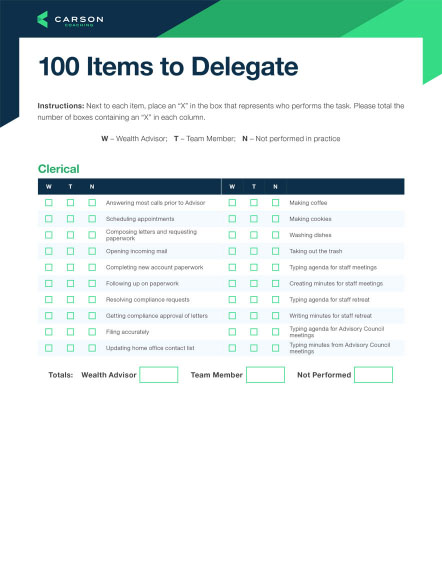Successful Advisor-CEOs are like thoroughbred racehorses. They can do things that most of us simply cannot. But so often advisor racehorses are shackled to the plow of running the business: managing staff, dealing with vendors and support services, addressing technology and compliance functions, and other administrative tasks that deplete energy and distract from the areas in which they truly excel.
What would happen if you were freed from these constraints and allowed to run full-out toward the finish line, toward new client acquisition and the fullest expression of your vision?
Optimizing your future success is inextricably linked with engaging a Director of Operations who ensures the day-to-day operations of your firm are expertly managed, and who translates your vision and best ideas from the conceptual to the actual.
A Model of Success
I previously managed the onboarding of new firms for a large RIA aggregator. Before Day One – when the company stroked the big check and the firm’s team members became employees of the mothership – the firm was expected to have a Director of Operations in place. Perceiving this as a request or suggestion would be a mistake. If no team member was qualified to step into that role, the firm was expected to hire someone, and they were held accountable.
Likewise, can you imagine a Fortune 500 firm without a Chief Operations Officer? The corporate world recognizes the value of this position. Isn’t your firm a microcosm of these larger companies: sales, marketing, finance, operations and customer service?
Realizing Your Firm’s Potential
The ideas in Gino Wickman’s book “Traction” have had a profound impact on the success of many organizations, helping them become structured, intentional, thoughtful and communicative in all aspects of their business. The outcomes are often huge increases in revenue; happier, more productive employees; and an organization that realizes the potential of the founder’s vision. Many advisory firms, including Carson, are employing “Traction” concepts today.
A principal tenet in the book is the recognition that people who have the unique abilities required to start a business are extremely unlikely to be effective at managing that business. Realizing a firm’s potential is a result of a healthy partnership between the opposite yet complementary strengths of what Gino Wickman calls the Visionary and the Integrator.
Think about the Disney brothers. Walt’s strengths were boundless creativity, imagination and inspiration. Brother Roy was skilled at organizing, prioritizing, focusing, developing and ensuring process and consistency.
The transformative possibilities of the Visionary-Integrator partnership were thought to be so profound that Wickman and Mark C. Winters wrote another book devoted exclusively to this concept called “Rocket Fuel.”
A Desperate Need
Do you recognize that the skills that make you a great advisor are not the same skills required to run a flourishing firm?
As a proud member of the Carson coaching team, I speak regularly with advisory firms of all sizes and business models. Most do not have a Director of Operations, yet desperately need one. They sometimes complain about the important work that needs to be done that they don’t want to do.
With a Director of Operations in place, you are free to singularly focus on the aspects of your advisor and leadership responsibilities that play to your strengths. Conveniently, these same activities have the biggest impact on revenue and are the most fun!
What a great gift, a delicious freedom, to spend your time on the parts of the business you both enjoy and have great facility, while a trusted colleague of equal dedication and competence but opposite mental wiring and organizational focus delivers on the rest of it.
Remember, even the best strategies have no value if they remain unimplemented. The Director of Operations is your implementor.
Find Your Perfect Complement
If you don’t have a Director of Operations or Chief Operations Officer as part of your team now, recruit your ideal candidate as soon as possible. Start with a clear, detailed description of what you need the role to accomplish, the skills and experience that would enable someone to be successful in the role, and the personal characteristics required to be successful in your firm (think cultural alignment).
With all the effort you’ve invested in building your firm, don’t you deserve to work with your perfect complement?
Be the Triple Crown winner you are intended to be.


